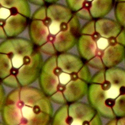Casting a golden net
Indium tin oxide (ITO) is a popular material for making transparent electrodes for devices like solar cells and organic light-emitting diodes, but it is expensive and complicated to manufacture.
Ivan Vakarelski of Kyoto University in Japan and the Institute of Chemical and Engineering Sciences, in Singapore, and colleagues at Kyoto University and The University of Melbourne in Australia have developed a tabletop method for making a conducting, gold wire mesh that could be an alternative to ITO. They deposit a droplet of liquid containing gold nanoparticles on a two-dimensional monolayer of latex microspheres on a glass slide. As the liquid evaporates, it falls lower into the bed of spheres, ultimately forming a network of connected droplets on the substrate that dries into a gold wire mesh.
The drying process is difficult to explain with a simple model, but the group shows that the presence of a surfactant in the liquid, rather than the liquid’s surface tension alone, is the key to forming robust liquid bridges that don’t break during the drying process.
According to theoretical estimates, these gold mesh structures should be almost as conducting as ITO and they are just as transparent. Moreover, the fabrication method is flexible. For example, by evaporating the gold nanoparticles on double layers of the latex spheres, the group can engineer three-dimensional structures, and it is possible that in the future other materials—like carbon nanotubes—could substitute for the gold nanoparticles. – Jessica Thomas





